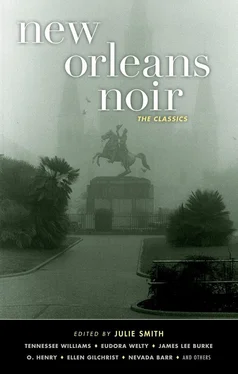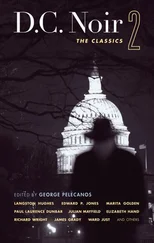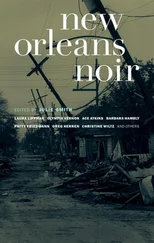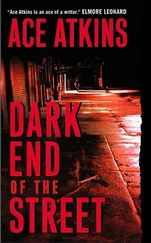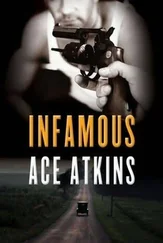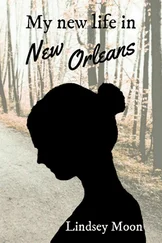Ace Atkins - New Orleans Noir - The Classics
Здесь есть возможность читать онлайн «Ace Atkins - New Orleans Noir - The Classics» весь текст электронной книги совершенно бесплатно (целиком полную версию без сокращений). В некоторых случаях можно слушать аудио, скачать через торрент в формате fb2 и присутствует краткое содержание. Город: New York, Год выпуска: 2016, ISBN: 2016, Издательство: Akashic Books, Жанр: Детектив, на английском языке. Описание произведения, (предисловие) а так же отзывы посетителей доступны на портале библиотеки ЛибКат.
- Название:New Orleans Noir: The Classics
- Автор:
- Издательство:Akashic Books
- Жанр:
- Год:2016
- Город:New York
- ISBN:978-1-61775-384-8
- Рейтинг книги:3 / 5. Голосов: 1
-
Избранное:Добавить в избранное
- Отзывы:
-
Ваша оценка:
- 60
- 1
- 2
- 3
- 4
- 5
New Orleans Noir: The Classics: краткое содержание, описание и аннотация
Предлагаем к чтению аннотацию, описание, краткое содержание или предисловие (зависит от того, что написал сам автор книги «New Orleans Noir: The Classics»). Если вы не нашли необходимую информацию о книге — напишите в комментариях, мы постараемся отыскать её.
takes a literary tour through some of the darkest writing in New Orleans history.
New Orleans Noir: The Classics — читать онлайн бесплатно полную книгу (весь текст) целиком
Ниже представлен текст книги, разбитый по страницам. Система сохранения места последней прочитанной страницы, позволяет с удобством читать онлайн бесплатно книгу «New Orleans Noir: The Classics», без необходимости каждый раз заново искать на чём Вы остановились. Поставьте закладку, и сможете в любой момент перейти на страницу, на которой закончили чтение.
Интервал:
Закладка:
Lena and Chris went away because he had to get back to camp. And for the first time since I could remember, I had a room all to myself. So I made Lena’s bed all nice and careful and put the fancy spread that Ma had crocheted on it — the one we hardly ever used. And put the little pink celluloid doll in the middle.
Sometime after the wedding, I don’t remember exactly when, Pete had an accident. He’d been out on a long run, all the way up to Abiline. It was a long hard job and by the time he got back to town he was dead tired, and so he got a little careless. In the switch yards he got his hand caught in a loose coupling.
He was in the hospital for two weeks or so, in the colored surgical ward on the second floor of a huge cement building that said Charity Hospital in carved letters over the big front door. Ma went to see him on Tuesdays and Saturdays and I just went on Saturdays. Walking over from the bus, we’d pass Lefty’s Restaurant and Café. Ma would turn her head away so that she wouldn’t see it.
One time, the first Saturday I went with Ma, we brought Pete a letter, his induction notice. He read it and started laughing and crying all at once — until the ward nurse got worried and called an intern and together they gave him a shot. Right up till he passed out, he kept laughing.
And I began to wonder if it had been an accident...
After two weeks he came home. We hadn’t expected him; we hadn’t thought he was well enough to leave. Late one afternoon we heard steps in the side alley; Ma looked at me, quick and funny, and rushed over to open the door: it was Pete. He had come home alone on the streetcar and walked the three blocks from the car stop. By the time he got to the house he was ready to pass out: he had to sit down and rest his head on the table right there in the kitchen. But he’d held his arm careful so that it didn’t start to bleed again. He’d always been afraid of blood.
Accidents like that happened a lot on the road. Maybe that was why the pay was so good. The fellows who sat around the grocery all day or the bar all had pensions because they’d lost an arm or a hand or a leg. It happened a lot; we knew that, but it didn’t seem to make any difference.
Ma cried very softly to herself when she saw him so dizzy and weak he couldn’t stand up. And I went out in the backyard, where he couldn’t see, and was sick to my stomach.
He stayed in the house until he got some strength back and then he was out all day long. He left every morning just like he was working and he came back for dinner at night. Ma asked him once where he went, but he wouldn’t say; and there was never any trouble about it. A check came from the railroad every month, regular; and he still gave Ma part of it.
Pete talked about his accident, though. It was all he’d talk about. “I seen my hand,” he’d tell anybody who’d listen. “After they got it free, with the blood running down it, I seen it. And it wasn’t cut off. My fingers was moving. I seen ’em. Was no call for them to go cut the hand off. There wasn’t any call for them to do that, not even with all it hurting.” (And it had hurt so bad that he’d passed out. They’d told us he just tumbled down all of a sudden — so that the cinders along the tracks cut in his cheek.)
He’d say: “Iffen it wasn’t a man my color they wouldn’t done it. They wouldn’t go cut off a white man’s hand.”
He’d say: “It was only just one finger that was caught, they didn’t have cause to take off the whole hand.”
And when I heard him I couldn’t help wondering. Wondering if maybe Pete hadn’t tried to get one finger caught. The army wouldn’t take a man with one finger missing. But just one finger gone wouldn’t hamper a man much. The way Pete was acting wasn’t like a man that had an accident he wasn’t expecting. But like a man who’d got double-crossed somehow.
And looking at Ma, I could see that she was thinking the same thing.
Lena came home after a couple of months — Chris had been sent overseas.
She used to spend most of her days lying on the bed in our room, reading a magazine maybe, or writing to Chris, or just staring at the ceiling. When the winter sun came in through the window and fell on her, her skin turned gold and burning.
Since she slept so much during the days, often in the night she’d wake up and be lonesome. Then she’d call me. “Celia,” she’d call real soft so that the sound wouldn’t carry through the paperboard walls. “Celia, you awake?” And I’d tell her yes and wake up quick as I could.
Then she’d snap on the little lamp that Chris had given her for a wedding present. And she’d climb out of bed, wrapping one of the blankets around her because it was cold. And she’d sit on the cane-bottomed old chair and rock it slowly back and forth while she told me just what it would be like when Chris came back for her.
Sometimes Pete would hear us talking and would call: “Shut up in there.” And Lena would only toss her head and say that he was an old grouch and not to pay any attention to him.
Pete had been in a terrible temper for weeks, the cold made his arm hurt so. He scarcely spoke anymore. And he didn’t bother going out after supper; instead he stayed in his room, sitting in a chair with his feet propped up on the windowsill, looking out where there wasn’t anything to see. Once I’d peeped in through the half-opened door. He was standing in the middle of the room, at the foot of the bed, and he was looking at his stub arm, which was still bright-red-colored. His lips were drawn back tight against his teeth, and his eyes were almost closed, they were so squinted.
Things went on this way right through the first part of the winter. Chris was in Japan. He sent Lena a silk kimono — green, with a red dragon embroidered across the back. He didn’t write much, and then it was just a line saying that he was fine. Along toward the middle of January, I think it was, one of the letters mentioned fighting. It wasn’t so bad, he said; and it wasn’t noisy at all. That’s what he noticed most, it seemed: the quietness. From the other letters we could tell that he was at the front all the rest of the winter.
It was March by this time. And in New Orleans March is just rain, icy splashing rain. One afternoon I ran the dozen or so blocks home from school and all I wanted to do was sit down by the stove. I found Ma and Pete in the kitchen. Ma was standing by the table, looking down at the two yellow pieces of paper like she expected them to move.
The telegram was in the middle of the table — the folded paper and the folded yellow envelope. There wasn’t anything else, not even the big salt shaker which usually stood there.
Ma said: “Chris got himself hurt.”
Pete was sitting across the room with his chair propped against the wall, tilting himself back and forth. “Ain’t good enough for nothing around here,” he said, and rubbed his stump arm with his good hand. “Ain’t good enough for white people, but sure good enough to get killed.”
“He ain’t killed,” Lena said from the next room. The walls were so thin she could hear every word. “He ain’t got killed.”
“Sure, Lena, honey,” Ma said, and her voice was soft and comforting. “He going to be all right, him. Sure.”
“Quit that,” Ma told Pete in a fierce whisper. “You just quit that.” She glanced over her shoulder toward Lena’s room. “She got enough trouble without you adding to it.”
Pete glared but didn’t answer.
“You want me to get you something, Lena?” I started into our room. But her voice stopped me.
“No call for you to come in,” she said.
Maybe she was crying, I don’t know. Her voice didn’t sound like it. Maybe she was though, crying for Chris. Nobody saw her.
Читать дальшеИнтервал:
Закладка:
Похожие книги на «New Orleans Noir: The Classics»
Представляем Вашему вниманию похожие книги на «New Orleans Noir: The Classics» списком для выбора. Мы отобрали схожую по названию и смыслу литературу в надежде предоставить читателям больше вариантов отыскать новые, интересные, ещё непрочитанные произведения.
Обсуждение, отзывы о книге «New Orleans Noir: The Classics» и просто собственные мнения читателей. Оставьте ваши комментарии, напишите, что Вы думаете о произведении, его смысле или главных героях. Укажите что конкретно понравилось, а что нет, и почему Вы так считаете.
